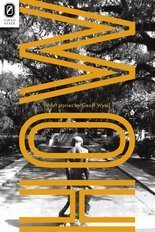Razor-sharp Poignance in Geoff Wyss’s “How”

Geoff Wyss. Photo by Samantha Scheel.
Last summer at the Sewanee Writers Conference, I picked up a copy of Geoff Wyss’s story collection, “How,” winner of the Ohio State University Prize in Short Fiction. I’ve savored one story a week over the past eleven weeks, and now find myself envying everyone who has the pleasure of reading this extraordinary collection for the first time. Wyss is a New Orleans school teacher, and some of the stories here are steeped in the atmosphere of the faculty lounge, faintly buzzing with gossip, the tense classroom relationships, haunted by the burnt-out teacher who wants to be left alone to do his work, or left alone period. Wyss’s dark comic sense is burnished to a mature gleam here, with characters that could only be so fully drawn by a writer who has spent some years studying human nature. He isn’t bothered a whit with the current popular argument over characters’ likability. Those populating the New Orleans of “How” are simultaneously droll and rude, tender and mean-spirited, charmed and charming, and you can’t take your eyes off them. Or your ears, I should say. Line for line, the prose crackles. Listen to this, from a story titled “Exit Strategy”:
“Every time she used a kitchen knife, she imagined cutting her finger off. You know how your brain gets stuck, looping its junk on cue? Freaking itself out, filling time as it falls apart? Except that lately she’d been seeing it so vividly that she’d started to think it wasn’t dementia, her mind misfiring, but a premonition: the knife slipping off a tomato and diving into the first knuckle of her finger, shushing through the bone, clean and for a moment painless, the exposed rings of her finger glowing like a lit cigarette. She had never cut herself in the kitchen. Didn’t that make it more likely every time?”
I mean, Ouch. You practically feel the citrus sting of tomato juice as it rinses over open flesh. Shannon, in whose point of view this story is told, is drawn to a guy who works out at her gym, while she is simultaneously horrified that she is attracted to him. Wyss’s sentences spool out in what I have to call physical lyricism, so closely following the irritation of the senses, his characters’ hairy legs and their junk-looping brains.
The protagonist of “Arms” doesn’t need to go into his own backstory when his perception of his girlfriend’s pals tells us so much about him: ”Tim wore Goth makeup and had a beer belly. Vicki was a wan, wordless girl who seemed deficient in protein and never looked up from the table. … They had been coming here since they were the age of the fake-ID kids crashing together on the dance floor. This is where they had huddled while time besieged them, and they looked a little disappointed by the discovery that they had somehow survived and were now twenty-three.”
The narrator of “Saints and Martyrs” pulls no punches when describing her moment of attainment with her childhood sweetheart: “There’s no way to hide the fact that neither of us is much to look at. Don is slim, but he’s maintained his slimness by slowly ceding his muscles, so that his visual effect is soft and milky, like boiled veal.” She is no easier on her own physicality: “I am, from the waist down, absolutely impervious to all diets and forms of exercise. It’s my huge ass that is, in some way, the source of all my humiliations and achievements, the way the Civil War is for the South.”

HOW. Available from Ohio State University Press.
But lest you think Wyss is without sympathy for his characters, think again. If you’re paying attention, you’ll hear the low-register hum of what Steve Almond calls “radical empathy.” If we haven’t experienced at least some of the disappointments of the ordinary, desperate folks who people “How,” or blundered as badly, then maybe we’ve been living too cautiously. It’s the stealth element here that will sock you in the gut. Because as soon as you’re done laughing—or wincing (and you will wince sometimes)—at one character’s raunchy line, Wyss delivers a tiny personal bomb, no less revelatory for being lit by roadside fireworks than if it had been itself a burning bush.
Paulette Livers at GoodReads
- Paulette Livers's profile
- 40 followers



